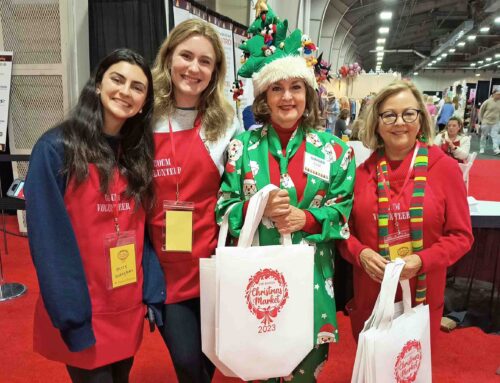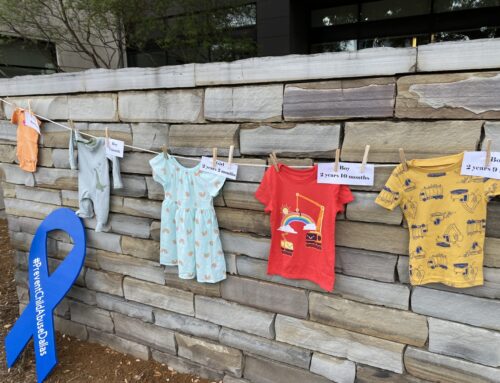It’s 9 a.m. in a Dallas County courtroom, and a group huddles around the judge’s bench. Among them a woman, barely 20, hangs her head. The hair that falls around her face needs washing; her sweatshirt smells unclean. She wipes a hand under her eyes, then to her jeans.
“Are you Karen Smith*?” the judge asks.
“Yes.”
“Are you the mother of 4-year-old Jessica Smith, 2-year-old Terrence Smith and 1-year-old Crystal Smith?”
“Yes.”
This hearing is one of several to decide if the Smith kids will ever go home again. The questioning continues a few minutes more, and then the courtroom falls silent. The judge takes a breath before speaking again: “OK, I want a drug test and psychological evaluation on the mom. And parenting classes. Full medical and psychological evaluations of the kids, who will remain in foster care. And I want CASA on this one.”
In Dallas County, scenes like this one play out repeatedly. The judge won’t see the case again until the next hearing. The Child Protective Services (CPS) caseworker will do his best for the children involved, but he has more than a hundred others to track.
The newly assigned Dallas CASA (Court Appointed Special Advocates) volunteer, however, will do whatever it takes to make sure the kids don’t get lost in the system. She will work on that case, and only that case, until the children are permanently placed in a home.
And being a volunteer, she won’t be paid a dime. What she will get is the knowledge that she made a difference in the lives of three children.
Lucie Boggs, a Lakewood resident, became involved with CASA three years ago. Until that time, she had never worked with abused kids, never even heard of CASA. But when she learned about it through Junior League, she decided to get involved.
Boggs went through the training and learned the types of things she’d be dealing with. “Still,” she says, “you’re just never prepared for what you see.”
Her first case involved a three-year-old girl named Jessica who had been severely abused. Her parents’ rights had been terminated, and she was living in a foster home.
Boggs quickly saw that Jessica had significant needs that her foster parents were not meeting. “She wasn’t being abused,” Boggs says, “but she just wasn’t making any progress. She was almost four and still not potty trained. My roll was to take care of her and see she’s getting what she needs, and she wasn’t.”
Boggs knew Jessica should be moved to a different foster home, but with the shortage of facilities in Dallas County, it wasn’t an easy task. “It’s very difficult to get a child moved, butting heads with CPS,” she says. “I was so sick of fighting people, at times I wanted to quit. But I couldn’t quit on her. I was all she had.”
Boggs enlisted the help of her supervisor and the program director at CASA, and together they persisted until they got her into a new foster home.
It was just what Jessica needed. “She was potty trained within a matter of weeks,” Boggs says. “She made progress with her colors and alphabet, she communicated better, she even started growing. It’s amazing to see what a loving, consistent environment makes — they blossom like you’d never imagine.”
A year after Jessica was moved into her new foster home, a couple decided to adopt her.
Boggs drove Jessica to her new home in Houston. An hour before they arrived, Jessica told her she wanted to turn around and go back. She didn’t want Boggs to leave her.
But when they arrived at her new home, things quickly changed. Jessica saw her very own room made up with her own clothes and bed, along with her new sister and parents who were happy she was there.
“By the time I told her I was about to go, she was like, ‘OK, see ya!’ She was totally fine,” Boggs says. “It was so touching to see her experience this after all she’d been through. That was a true blessing.”
Many CASA cases have happy endings just like Jessica’s. Melinda Poss’ experience as a volunteer, though, hasn’t included very many.
Poss became a volunteer 10 years ago, soon after moving to Dallas. She was looking to become involved in something and read about CASA volunteer opportunities in a local magazine.
Most of the children Poss has worked with had serious medical needs. She has worked with crack babies, kids with severe respiratory problems, autism and other illnesses. “The cases I’ve worked on weren’t because the parents were bad,” she says, “but more because of circumstances. The parents just weren’t equipped for it.”
Poss, who runs an architectural company in Lakewood, has no training or background in medicine, but when she accepted her first medical case, she realized she had a knack for it.
“I guess my mind just works that way,” she says. “I know how to make sense of the bureaucracy and wanted to understand the different situations and medical prognoses. And I’m good at calling attention to things, a whistle blower.”
One of the worst cases involved a boy named Robert. His mother, who was from Mexico, suffered from rubella, or German measles, when she was pregnant with him. As a result, Robert was born with serious problems, and his mother snuck across the border to get him medical help. She kept him here for several years, but was reported for leaving him alone while she worked.
CPS took custody of Robert, whose file showed him to be profoundly retarded, blind and deaf, conditions often associated with children born to mothers afflicted with rubella during pregnancy. “But when I first met him,” Poss says, “I realized there was more of a kid there than what had been reported. He had more cognition than what the reports said. And I could see he had some hearing and a little bit of sight.
“At the time, the state wouldn’t pay for illegal aliens,” Poss says, “so we didn’t know what to do with him. We had to go through INS and Medicaid to get his medical bills paid for.”
Robert is now institutionalized and will remain so for the rest of his life. The mother has disappeared, Poss says, “but I hear she shows up periodically to visit him. It’s sad, because if he’d been born into a better financial situation, he might have had a better life.”
Cases like Robert’s have been valuable lessons for Poss.
“It’s like life,” she says. “They’re not all happy endings, and it doesn’t always turn out the way we want it to.”
Still, she knows her work has been important. “I feel like I’ve helped the system be accountable,” she says. “There are too many people saying, ‘That’s not my job.’ I don’t get depressed about it. Instead of complaining, I try to fix it.”
Poss says she’s seen another benefit from being a CASA volunteer. “I do it because it allows me to get beyond my white, middle-class existence. I’ve always wanted to have a bit more grounding in reality. And this allows me some of that.
“We reach across class lines and cultural boundaries that I was not particularly comfortable crossing when I started. Now, for many reasons, I’m completely comfortable with other communities. I enjoy it, being exposed to other things and helping to break down stereotypes.
“CASA is definitely not for everyone,” she says. “But I’ve learned so much and have had many new opportunities. Now I don’t say, ‘I can’t do that.’”
* Some names in this story have been changed to protect the identities of those involved.





